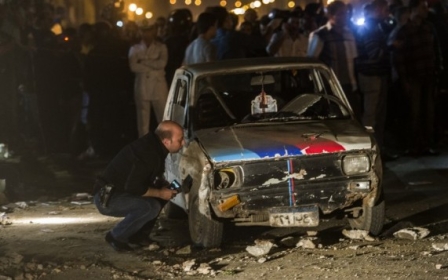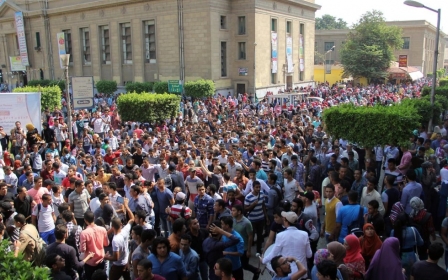Carter Center set to leave Egypt over democratic failings

The Carter Center, a human rights organisation founded by former US President Jimmy Carter, has closed its field office in Egypt after almost three years and has announced it will not be sending a delegation of observers to monitor the parliamentary elections set to take place later this year.
“The current environment in Egypt is not conducive to genuine democratic elections and civic participation,” said Jimmy Carter in a press release.
“I hope that Egyptian authorities will reverse recent steps that limit the rights of association and assembly and restrict operations of Egyptian civil society groups.”
They also warned that “in recent elections, Egyptian authorities have issued regulations that appeared to prohibit election observers from issuing any public reports or statements prior to the official announcement of results.”
Responding to Carter's announcement, Egypt's Ministry of Foreign Affairs said in a statement that it was "surprised" by the centre's move and said its explanation for closing its office "included wrong assumptions and biased conclusions".
The ministry said it questions the Carter Center's motives and objectives and denounced the organisation's "false claims" and "blatant contradictions".
The Carter Center first set up offices in Egypt following the 2011 Arab Spring demonstrations which ousted dictator Hosni Mubarak and monitored the presidential and parliamentary elections that followed.
Following the coup that overthrew the elected government of Mohammed Morsi, the Carter Center did not monitor the presidential elections that put former Field Marshal Abdel Fatah al-Sisi into power, with the Center at the time warning that “Egypt's political transition has stalled and stands on the precipice of total reversal.”
Among the recommendations, the Carter Center has suggested to improve foundations for democracy in Egypt. They urge Egyptian authorities to “ensure adequate protection for the right of freedom of association” and “end the crackdown on dissident groups, activists, journalists and others opposed to the regime, including the Muslim Brotherhood and its supporters.”
“I think it seems like a very sensible decision,” says Anthony Dworkin, a senior policy fellow at the European Council on Foreign Relations.
“Whatever is going on in Egypt at the moment, it doesn’t really look like a genuine transition to democracy and as far as I gather the Carter Center’s viewpoint is that the elections - which incidentally seem to be delayed repeatedly and it’s still not clear when they’re going to be held - are taking place against a background that means they can’t be described as free and fair and with a level playing field, and that seems to me a very well-founded judgement.”
Dworkin told Middle East Eye that, unlike other countries examined by the Carter Center, voting irregularities, such as ballot stuffing, took a backseat to other problems.
“I think the problem is more the background conditions against which elections are being held, which seem to me absolutely prohibitive for having an open competitive level playing field with all political viewpoints able to express themselves and be represented,” he said.
He also suggested that, ultimately, the Carter Center’s decision would be unlikely to phase Sisi’s government.
“The current political approach that they’re taking is very well-considered and deliberate and has been maintained fairly well consistently over the past year,” he told MEE.
“Clearly Egypt does care about its international reputation, but I think that they won’t be too worried by this and I think they’ll attach more importance to statements from western governments, the US and the EU, as to what they say and do around elections.”
Parliamentary elections are set to take place in Egypt in 2014, though a concrete date has yet to be set, with repeated delays usually attributed to the unstable security situation in the country.
In September, former independent MP and businessman Hamdy El-Fakharan filed a suit with Cairo's Administrative Justice Court arguing the elections should be delayed for a year or more.
"This one year delay is necessary until security forces are strong enough to safeguard candidates and election campaigns against any possible terrorist attacks," said El-Fakharany's lawsuit, adding that "the group of the Muslim Brotherhood...could exploit the polls to attack its arch rivals – including the candidates of political secular forces, non-Islamist independents and even the ultraconservative Nour Party – with the objective of dragging the country into a Syrian-style civil war."
Thousands have died in the crackdown against the Muslim Brotherhood and other anti-government activists following the coup in 2013.
According to some sources, more than 40,000 people have been arrested since July 2013 with hundreds facing trials in military courts.
Jimmy Carter has had a long history with Egypt . As US President, in the 1970's, he helped organise the Camp David Accords with then respective Egyptian and Israeli Presidents Anwar Sadat and Menachim Begin, which led to the peace treaty between the two neighbours that holds to this day.
New MEE newsletter: Jerusalem Dispatch
Sign up to get the latest insights and analysis on Israel-Palestine, alongside Turkey Unpacked and other MEE newsletters
Middle East Eye delivers independent and unrivalled coverage and analysis of the Middle East, North Africa and beyond. To learn more about republishing this content and the associated fees, please fill out this form. More about MEE can be found here.




